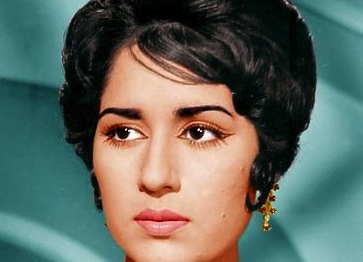Shamim Ara was Pakistani cinema’s top actress of the 1960s, taking over the post from the legendary Sabiha Khanum. What’s even more special about her tenure in the Pakistani film industry is that she has also had an extremely successful directorial career following her days as a leading lady.
Shamim Ara was born in 1937 or 1938, it isn’t certain, in Aligarh. She was trained in dancing by her mother, who harboured ambitions of making it as an actress but was unsuccessful. On a visit to Karachi in 1956, she met director Najam Naqvi who introduced her in his film Kunwari Bewa (1956), giving her the screen name Shamim Ara. Kunwari Bewa, however, flopped at the box office. Shamim Ara was then cast in Roop K Shorey’s Miss 56 (1956) opposite Aslam Pervez as the second lead but again the film did nothing much for her except for some token appreciation. She was prominently noticed first in Anwar Kamal Pasha’s Noor Jehan starrer, Anaarkali (1958), playing Noor Jehan’s younger sister. She also did a film as leading lady that year, Wah Re Zamane (1958) opposite Ejaz Durrani. Films like Alam Ara (1959), Mazloom (1959) and Raaz (1959) followed.
It was the mega success of Saheli (1960) set her well on the way to stardom. Though Saheli, a love triangle, was an out and out Nayyar Sultana show, Shamim Ara more than left her mark in the love triangle winning the Nigar Award for Best Supporting Actress. The film, which saw the two actresses play best friends, was the biggest success at the box office in Pakistan that year and besides fine performances by Sultana, Ara, Bahar Begum and Darpan, it’s melodious music, with songs like Hum Bhool Gaye Har Baar and Mukhre Pe Sehra Daale, became extremely popular.
Recognised by now as an extremely competant actress, Shamim Ara began getting cast as the female lead in A-1 productions. Films like Insaan Badalta Hai (1961), Zamane Kya Kahega (1961) and Qaidi (1962) proved to be extremely popular taking Ara to the very top. Qaidi, in particular, co-starring Darpan was a landmark film in Shamim Ara’s career. The film is most famous for arguably Noor Jehan’s greatest ever song, Mujhse Pehli Si Mohabbat Mere Mehboob Na Maang, picturised on Shamim Ara. The song, based on Faiz Ahmed Faiz’s verse and ‘gifted’ by him to Noor Jehan following her amazing rendering, has been voted as the greatest Urdu song ever!
Shamim Ara rose from strength to strength becoming the number one Pakistani actress through the 1960s with the popularity of films like Chingari (1964), Firangi (1964), Naila (1965), Aag ka Dariya (1966), Lakhon Mein Aik (1967), Saiqa (1968) and Salgirah (1969). What’s more, her powerhouse performances in these films saw her winning the Nigar Award for Best Actress for Firangi, Naila, Lakhon Mein Aik and Saiqa, which she also produced. Her performances were further enhanced in many of these films by some of Noor Jehan’s best songs going on her like Kali Kali Mundlaye (Chingari), Shikwa Nahin Kisi Se (Haveli), Hawa Se Moti Baras Rahen Hain (Aag ka Dariya), Chalo Achcha Hua Tum Bhool Gaye (Lakhon Mein Aik), Le Aayi Phir Kahan Par and Meri Zindagi Hai Naghma ( both Salgirah).
The 1970s saw younger heroines like Zeba, Deeba, Shabnam, Rani and Nisho take over and Shamim Ara ended her career as leading lady by the mid 1970s. However, she was already exploring other possibilities. Saiqa had been her first foray into film production and the mid 1970s saw her enter into film direction as well with Jeeo aur Jeene Do (1976).
Though Shamim Ara continued to act sporadically with her last film being the Punjabi film Tees Mar Khan (1989), her focus was now on direction. She has since directed many films which proved to be quite successful at the box office like Playboy (1978), Miss Singapore, Miss Columbo, Lady Smuggler (1987), Lady Commando (1989), Hathi Mere Sathi (1993) and Munda Bidga Jaaye (1995) among others. However, the quality of these films, pandering clearly to the box-office, is by and large questionable and the message they send out is debatable to say the least. Quoting Pakistani filmmaker and critic Omar Ali Khan on Playboy, a film supposedly telling immigrants that there is no place like home, “Playboy is a nauseating piece of deception and pathetic wishful thinking of the worst kind. The film is regressive and a blatant falsity. Yet it is considered a “classic” Lollywood creation – educational and informative. Ms. Shamim Ara would do a much greater service to her people if she showed them exactly why people are queuing up night and day to be able to get out of the Land of the Pure despite her best efforts.“
In spite of much success on the professional front, sadly Shamim Ara’s personal life has not been very happy. Her family thwarted her love story with actor Mohammed Ali and she had been married several times with none of the marriages working out.
Shamim Ara had gone into a coma for almost six years following brain surgery. She finally passed away in London on August 5, 2016.


